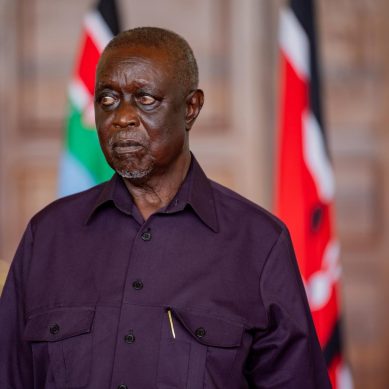
I have found there is a wonderful harmony in the complementary truths of science and faith. The God of the Bible is also the God of the genome. God can be found in the cathedral or in the laboratory. By investigating God’s majestic and awesome creation, science can actually be a means of worship – Francis Collins
If we agree and we should, that all knowledge, wisdom, understanding and insights come from God, as the God’s Word, the Bible, categorically states regarding the source of these virtues, then we shall not continue wrongly believing that these are virtues of human origin.
Says the book of Proverbs, 1:7, “To have knowledge you must first have reverence for the Lord”. In Proverbs 2:3-7 we are told: “Yes, beg for knowledge, plead for insight. Look for it as hard as you would for silver, or some hidden treasure. If you do you will know what it means to fear the Lord and you will succeed in learning about God. It is the Lord who gives wisdom; from him come knowledge and understanding”. In Proverbs, 2:9-11 we are told: “If you listen to me, you will know what is right, just and fair. You will know what you should do. You will become wise, and your knowledge will give you pleasure. Your insight and understanding will protect you and prevent you from doing wrong”.
Almost universally humanity has rejected this wise counsel and has instead used science, religion and politics to disconnect our species from God. In many instances we have rejected God altogether. The ultimate result is that we have continually been ignorant of what is right, just and fair. This ignorance explains the false knowledge, false truths, false wisdoms, false insights that have dominated our science, religions and politics for a very long time. The British empiricists of the seventeenth and eighteenth centuries, notably John Locke, George Berkeley and David Hume, held that all knowledge should be derived from ideas implanted in the mind by way of sense perception. The positivists had a somewhat broader and less psychologically-orientated view of what facts amount to, but shared the view of the empiricists that knowledge should be derived from the facts of experience. Thus, God and Empiricism were made strange bedfellows. Falsehoods in thinking and reasoning became integral to science and society.
Science as knowledge
One science falsehood is that science is science when it is knowledge derived from facts of human experience. There is no doubt that science is highly esteemed. Apparently, it is a widely held belief that there is something special about science and its methods. The naming of some claim or line of reasoning or piece of research “scientific” is done in a way that is intended to imply some kind of merit or special kind of reliability. But what, if anything, is so special about science? What is this “scientific method” that allegedly leads to especially meritorious or reliable results? (Chalmers, 2013). Three components of the stand on the facts assumed to be the basis of science in the common view can be distinguished. They are:(a) Facts are directly given to careful, unprejudiced observers via the senses. (b) Facts are prior to and independent of theory. (c) Facts constitute a firm and reliable foundation for scientific knowledge. Scientific knowledge has a special status in part because it is founded on a secure basis, solid facts.
In this article it should become clear that science so derived is subordinate to the science of the first scientist: God.
While science is a powerful and reliable method for gaining knowledge about the natural world, it does not encompass all forms of knowledge. For example, ethical, aesthetic and metaphysical knowledge are areas where science may not be the only source of understanding. Thus, science has limits for there are things it cannot do. (i) It cannot make moral judgements; ii) It cannot make aesthetic judgements; iii) It does not tell us how to use scientific knowledge; and iv) It does not draw conclusions about supernatural conclusions. Yet all these are important in universal knowledge. Domains such as ethics, aesthetics, and religion fundamentally influence human societies and how those societies interact with science. Topics like aesthetics, morality and theology are actively studied by philosophers, historians and other scholars. However, questions that arise within these domains generally cannot be resolved by science, although they can be informed by science.
Matthew Ward Agius (2023) in Cosmos of December 4, 2023 has addressed the question of how the abuse and falsehoods [of science] erode the public square of science. Joelle Renstrom (2023) addresses how the science enterprise itself fuels a culture of disinformation. He observes that:
- A flaw at the centre of the scientific enterprise is that it is all too easy to make outsize claims that sidestep the peer review process
- What the World Health Organisation (WHO) called disinformation pandemic (infodemic) in relation to Covid 19 can pollute the science enterprise
- Often misinformation and disinformation start with the scientists themselves
- Quantity rather than quality of publications has become a basis of incentive and this frequently compromises quality of science
- Scientific articles contain more jargon than substance, which encourages misinterpretation, political spin and declining public trust in the scientific process
- Addressing scientific misinformation requires top-down changes to promote accuracy and accessibility, starting with the scientists themselves and the scientific publishing process itself
- With scientific journals having digital counterparts, the number of published articles has risen supersonically and most academic institutions have preferred the digital approach to publication to help promote publication culture among their researchers driven by the Publish or Perish dictum
- Scientific journals and scientists are competing for clicks by readers just like the mainstream publications
- The articles that are downloaded, read and shared the most receive a “High Impact Factor” or Altimetric Attention Score
- People are likely to read and share articles with short, positively worded or invoking titles
- The demand for headline-worthy publications has led to mushrooming in quantity of research studies that cannot be replicated.
- Researchers are increasingly citing nonreplicable studies more often than replicable ones, perhaps because they tend to be more sensational and thus get more clicks.
No wonder the quality of research output is increasingly getting compromised. The greatest challenge is science for political and corporate ends. Our society is now governed by multifarious falsehoods, which are antagonistic to and serve to confuse humanity away from the truth. Most of the falsehoods relate to the relationships between the sciences (natural science, social science and arts or humanities), science and religion, science and politics and religion and politics. The falsehoods reflect man’s historical tendency to remove the centrality of God from his system of things or affairs. The system of things or affairs may be knowledge, truth, science, religion or politics. However, we may also say that the falsehoods arise from Man’s tendency to impose ignorance upon himself regarding God, and the extent to which his influence penetrated or penetrates all systems – natural and unnatural – specifically humanity and our affairs. Actors in religion and politics have exacted the worst cleavage between knowledge and truth, faith and knowledge, science and religion, religion and politics, usually for selfish interests.
In this article I will take science to be one, and the phrase diametrically opposed to mean antagonistic or completely different; and religion to mean spirituality or faith. The topic of my little thesis assumes that although the aim of knowledge is truth, there is imposed disconnection between knowledge and truth, knowledge and science, science and religion, science and spirituality, science and politics and religion and politics, which should not be the case.
All these ideas and practices penetrate each other and are interdependent and interconnected with God at their centre. We are acting the ignorant when we deliberately, persistently, consistently, continually and perennially extricate God from them. Doing so explains all the human miseries in terms of conflicts, wars, poverty, human rights abuses, dishonesty, robberies, killings, biological erosions, ecological erosions, social erosions, environmental erosions, spiritual erosions, moral erosions, ethical erosions, cultural erosions, wildlife erosions, ecosystems destruction, human dispossessions and displacements, intellectual erosions, superstition, errant science, misguided science to conquer the sun ostensibly to control climate change, artificial intelligence, et cetera. Ultimately the real connection between God and humanity is eroded.
Religion as knowledge
Religion is a legitimate component of a history of knowledge, and can indeed be viewed as knowledge. Religions produce doctrine, theories, room for action, models for interaction and practice, for self-fashioning et cetera, all part of the interwoven production and circulation of knowledge in a given historical context (Kajsa Brilkman and Anna Nilsson Hammar, 2019). Far from being mutually exclusive, religion and knowledge are intertwined”.
Politics as knowledge
Politics has been defined as ‘who gets what, when, where, how and why?” It may be exclusionary, inclusionary or visionary depending on how politically developed or politically illiterate one is in terms of political knowledge or capacity to manipulate the political environment, people or communities to serve one’s greed or selfishness. One writer once said that politics has existed as long as humans have faced scarcity, have had different beliefs and preferences, and have had to resolve these differences while allocating scarce resources. It will continue to exist so long as these human conditions persist – that is, forever. Politics is fundamental to the human condition.
It is where political leadership and governance of a country occurs and most problems in a country are due to wrong choices, ignorance, greed and selfishness of the leaders or governors or their failure to use their political knowledge, experience or practice in service of the people, communities or country in favour of their own political and economic interests or the political and economic interests of foreigners.
In countries such as Uganda civic education through political education has been politically abolished. Simultaneously, the political leadership is against the social sciences and the humanities because that is where their faulty choices and failures are likely to be contradicted, tested and publicly voiced. They are forcing everyone to take the natural sciences seriously because that is where political silence is likely to manifest itself. However, in countries such as the US civic education is back on the agenda of political science and education. Despite huge increases in the formal educational attainment of the US population during the past 50 years, the levels of political knowledge have remained very low because the political system has emphasized corporatism and money. Today’s college graduates know no more about politics than did high school graduates in the 1950s.
Ugandans are replicating political ignorance due to falling political knowledge among the population and among the highly educated, especially since 1986. The political leaders and governors emphasise silence politics, obedience politics and worship politics. Intellectual debates, which used to help raise consciousness, especially among the young, have been almost erased.
Money is being used as a tool of stupefaction of the masses through schemes such as UPE. USE, Myooga, Operation Wealth Creation Parish Development Model and Bonna Bagaggawale. Yet as they are implemented , poverty of the mind and income poverty continue to rise supersonically among the broad masses of people because they target a select few individuals, often in a partisan manner.
Recent research indicates that levels of political knowledge affect the acceptance of democratic principles, attitudes toward specific issues, and political participation. There is evidence that political participation is in part a positional good and is shaped by relative as well as absolute levels of educational attainment.
Contrary to findings from 30 years ago, recent research suggests that traditional classroom-based civic education can significantly raise political knowledge. Service learning, a combination of community-based civic experience and systematic classroom reflection on that experience is a promising innovation. However, programme evaluations have yielded mixed results. Longstanding fears that private schools will not shape democratic citizens are not supported by the evidence, at least in the USA. In Uganda, all this may not be true because of Presidentialism, whereby the President is at the centre of everything, emphasis being on his political fortunes, choices and decisions in a sea of poverty and ignorance. The regional perspectives of the President’s political manifestation are casting the Great Lakes region as a region of chaos, violence, land grabbing, robbery of natural resources, wars, conquests, domination and mass genocide.
Whatever the case, science, religion and politics are the three most important factors fragmenting knowledge and delinking knowledge from truth, yet they are all integral to the knowledge-truth continuum in the past and present, and unless we intervene with knowledge and new approaches to knowledge generation and transfer, we shall continue to pretend that we are knowledge workers, knowledge purveyors and knowledge conservators. All humanity must be part of a global programme to defragment knowledge and reintegrate knowledge with truth as one as God, the first scientist wanted it to be and still wants it to be.
- A Tell report / By Oweyegha-Afunaduula / Environmental Historian and Conservationist Centre for Critical Thinking and Alternative Analysis (CCTAA), Seeta, Mukono, Uganda.
About the Centre for Critical Thinking and Alternative Analysis (CCTAA)
The CCTAA was innovated by Hyuha Mukwanason, Oweyegha-Afunaduula and Mahir Balunywa in 2019 to the rising decline in the capacity of graduates in Uganda and beyond to engage in critical thinking and reason coherently besides excellence in academics and academic production. The three scholars were convinced that after academic achievement the world outside the ivory tower needed graduates that can think critically and reason coherently towards making society and the environment better for human gratification. They reasoned between themselves and reached the conclusion that disciplinary education did not only narrow the thinking and reasoning of those exposed to it but restricted the opportunity to excel in critical thinking and reasoning, which are the ultimate aim of education. They were dismayed by the truism that the products of disciplinary education find it difficult to tick outside the boundaries of their disciplines; that when they provide solutions to problems that do not recognise the artificial boundaries between knowledges, their solutions become the new problems. They decided that the answer was a new and different medium of learning and innovating, which they characterised as “The Centre for Critical Thinking and Alternative Analysis” (CCTAA).







